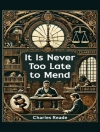In ‘Linda Tressel, ‘ Anthony Trollope weaves a compelling narrative that explores themes of love, identity, and social obligation in Victorian England. Employing his signature blend of detailed character studies and incisive social commentary, Trollope crafts a tale centered around the titular character, Linda, who grapples with the constraints of her society while seeking personal fulfillment. The novel is characterized by its intricate plotting and the rich psychological depth Trollope offers, making it a salient work in the development of 19th-century English literature, particularly within the genre of social realism. Anthony Trollope, a distinguished author of the Victorian era, was known for his keen observations of human behavior and societal norms. His personal experiences, including his time spent in diverse socio-economic environments and his role within the Post Office, provided him with a unique lens to engage with the complexities of social class. These insights undoubtedly shaped his creation of Linda, whose struggles reflect the tension between individual desire and societal expectation, making this novel a critical commentary on Victorian morality. Readers who appreciate literary explorations of character psychology and social critique will find ‘Linda Tressel’ an enriching experience. Trollope’s deft storytelling, coupled with his empathetic portrayals of complex figures, invites readers into a world where love clashes with social duty, engaging them in a profoundly thought-provoking exploration of the human condition.
Despre autor
Anthony Trollope (1815-1882) was an English novelist of the Victorian era, known for his insightful and satirical depiction of the mid-19th-century British society. Trollope’s prolific output includes 47 novels, numerous short stories, and several books on travel. Among his best-known works are the ‘Chronicles of Barsetshire’ and the ‘Palliser’ series. His writing style is characterized by a richly detailed and realistic narrative that often explores the moral dilemmas faced by his characters, reflecting the changing social landscape of the times.
‘Linda Tressel’ (1868), although not as widely celebrated as some of his other publications, exemplifies Trollope’s ability to delve into the lives of the provincial middle class and the pressures exerted upon the individual by societal norms and expectations. The tale of its eponymous heroine presents a critical look at the institution of marriage and the plight of women in 19th-century England, an aspect of his literature that frequently outshined in social commentary. Genealogically located between ‘He Knew He Was Right’ (1869) and ‘Phineas Redux’ (1874), ‘Linda Tressel’ continues to speak to contemporary readers through its timeless exploration of human nature and societal constraints. His work not only offers entertainment but also serves as an important historical lens through which the nuances of Victorian life can be examined.












